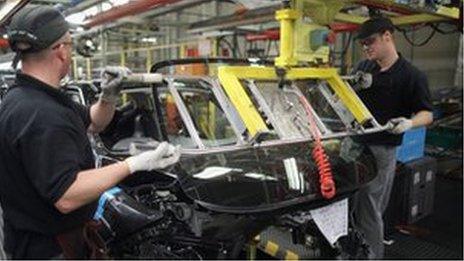Higher-quality apprenticeships to be graded
- Published

David Cameron announced new apprenticeship rules at the Mini car plant in Oxford
A new type of high-quality apprenticeship is to be introduced in England, with apprentices being awarded different grades according to ability.
These tougher apprenticeships were unveiled by Prime Minister David Cameron on a visit to BMW's Mini car plant in Oxford.
They will be offered by 60 firms from next year and will run in parallel with existing apprenticeships.
Mr Cameron promised the "best apprenticeships in the world".
The new apprenticeships are designed to raise the quality of the schemes and make them more straightforward for employers.
They are being brought in as a response to the Richard Review last year which called for the status and quality of apprenticeships to be much more clearly defined.
Independent assessment
Apprentices completing their training will be graded as either pass, merit or distinction, giving a clearer impression of their level of achievement, rather than a simple pass or fail.
The new apprenticeships will be based on "rigorous independent assessment", with at least two thirds of the assessment taking place at the end of the training.
Training will have to last at least one year and must include at least 20% time away from where the apprentice is working.
There are also plans for apprentices to have English and maths at a level equivalent to a good GCSE.
The new system, beginning from the end of 2014, will be shaped around the needs of employers in specific sectors.
These will be aerospace, automotive, digital industries, electro-technical, energy, financial services, food and drink, and life and industrial sciences.
Among the firms supporting the plans are Airbus, Rolls Royce, BMW, Ford, Toyota, Microsoft, British Gas, Barclays, Unilever and GSK.
"The reforms we're announcing today will put employers in the driving seat and ensure that we deliver rigorous training that supports you and our economy for years to come," said Mr Cameron.
"I think apprenticeships can be a big part not just of tackling unemployment but also in making sure our recovery is for all.
"We've seen 1.5 million people start apprenticeships under this government, I want to make sure the apprenticeships are good quality so we are announcing new rules today to make sure that happens."
But Labour's shadow skills minister, Liam Byrne, said the proposals "don't go far enough".
"The number of apprenticeship starts is falling at a time when youth unemployment stands at nearly a million. According to the government's own research, one in five apprentices report receiving neither on- or off-the-job training as part of their apprenticeship, and 29% of apprentices receive less pay than they are legally entitled to," said Mr Byrne.
The national chairman of the Federation of Small Businesses, John Allan, said: "These schemes should be recognised as vital introductions to careers that can take an individual all the way to the top in the business.
"We hope the reforms announced today will strengthen and protect the image of apprenticeships which, over the years, has been damaged by constant change."
The reforms were welcomed by the Chartered Institute of Personnel and Development as a step towards making such vocational training becoming "as equally an attractive prospect to young people and their parents as a university education".
Adam Marshall, policy director at the British Chambers of Commerce said: "Empowering employers to set standards for apprenticeships is a positive step forward."
But while welcoming an increased emphasis on quality, Dr Marshall warned that a "one-size-fits-all approach will not work".
The Association of Employment and Learning Providers warned that the changes might work better for large employers and warned that the grading system was not "appropriate" and could create too much bureaucracy.
- Published21 June 2013

- Published27 November 2012
